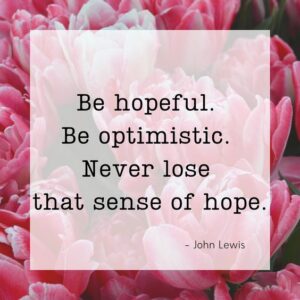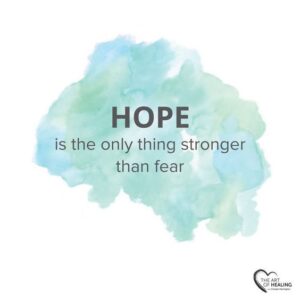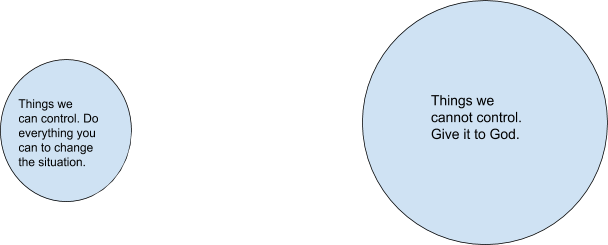By: Keely Kelley, LPC-intern
“If you carry one thing throughout your life, let it be hope. Let it be hope that better things are always ahead. Let it be hope that you can get through even the toughest of times. Let it be hope that you are stronger than any challenge that comes your way. Let it be hope that you are exactly where you are meant to be right now, and that you are on the path to where you are meant to be… Because during those times, hope will be the very thing that carries you through.” -Nikki Banas
 As COVID is still a problem that we are facing in our everyday lives, feeling hopeless is an emotion that many of us are experiencing. I want to share with you guys that even though it can be scary/uncertain/worrisome, hope is even more important to hold on to right now because hope is the only thing stronger than fear. Science even agrees that being hopeful and optimistic is something we should be mindful of. Many large-scale meta-analysis (big word meaning scientists gather information from a large pool of multiple studies) show that optimism has been associated with lower risk of cardiovascular events and hope has reduction in the long-term effects of chronic diseases. Which should be noted that is very relevant to those most at risk during this pandemic (The Case for Hope: Why We Need Optimism in the Face of COVID-19., 2020). Optimism is not the denial of reality, but the belief that the future will be better.
As COVID is still a problem that we are facing in our everyday lives, feeling hopeless is an emotion that many of us are experiencing. I want to share with you guys that even though it can be scary/uncertain/worrisome, hope is even more important to hold on to right now because hope is the only thing stronger than fear. Science even agrees that being hopeful and optimistic is something we should be mindful of. Many large-scale meta-analysis (big word meaning scientists gather information from a large pool of multiple studies) show that optimism has been associated with lower risk of cardiovascular events and hope has reduction in the long-term effects of chronic diseases. Which should be noted that is very relevant to those most at risk during this pandemic (The Case for Hope: Why We Need Optimism in the Face of COVID-19., 2020). Optimism is not the denial of reality, but the belief that the future will be better.
Transcendent Hope
Let’s dive deep for a minute into different types of hope and look specifically at transcendent hope. Transcendent hope encompasses three types of hope:
- Patient Hope: A hope that everything will work out well in the end.
- Generalized Hope: Hope not directed toward a specific outcome.
- Universal Hope: A general belief that in the future and a defense against despair in the face of challenges*.
*What is Hope in Psychology 7 Exercises & Worksheets, 2020
A hopeful individual recognizes that life may not work out as planned, yet maintains positive expectancy directed toward possible outcomes that hold personal significance (Miceli & Castelfranchi, 2010).
So how do we boost our sense of hope in our own lives?
 Keep a Hope Journal
Keep a Hope Journal
Practicing self-reflection by journaling has been proven to be helpful (Crain & Koehn, 2012). Write down challenges that you are facing, what gives you hope, what could potentially give you hope, and take note of factors that may impede the development of a more hopeful outlook. To be most effective, a hope journal should be maintained for at least 2 weeks. Some prompts for a hope journal could include:
- What does it mean to have hope?
- What are the benefits of having hope?
- What does a hopeful person look and sound like?
- How have you used hope in your own life?
- Are there any risks to having hope?
- If a picture on your wall could remind you of hope every morning, what would that picture be?
- What is the smallest possible change that could increase your hope?
- Try to think about some communities or individuals that might benefit from hope?
- Consider different ways of expressing hope within different communities. Do you think some methods would be more effective than others and why?*
Set Goals That Are Achievable
Something as small as brushing your teeth or something big such as a life/work goal you have been wanting to achieve. Goals give us hope and completing those goals instills hope. You want to pick a goal that is meaningful to you to dedicate your time and energy towards (Lopez, S., Marks, J., Hurley, K., Seitzer, M., Rauf, D., & Upham, B. ‘Hope Therapy’ Helps Fight Depression – Depression Center – Everyday Health., 2020).
Give Yourself Some Grace
Obstacles happen in life, it is inevitable. Allowing yourself some grace to accept that things happen, it was out of your control, and focusing on things you can do today to overcome the obstacle. You can think of these events going in our “small circle”. Once you have tried everything in your power to overcome the obstacle, it goes to the “big circle” and it is God’s turn to take control of the situation.

Borrow Hope
Ask your support system, those around you that love and care for you, to help keep you moving and looking forward. It is okay to ask for help and it is totally okay to need help.

